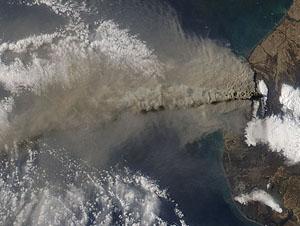Economic fallout from volcanic ash cloud
Ash plume from Eyjafjallajokull Volcano over the North Atlantic. (Image by Flickr user NASA Goddard (cc: by-nc-sa))
This story is adapted from a broadcast audio segment; use audio player to listen to story in its entirety.
Four hundred tons of flowers sat rotting in the cold room of an airport in Kenya over the weekend, waiting to be shipped to Europe. These flowers are among the first collateral damage of the Icelandic ash cloud which has turned most of Europe’s airspace into a no-fly zone and delayed travel for some 6.8 million people.
As the high altitude ash plume from Iceland’s Eyjafjallajökull volcano halts air travel around Europe and beyond, another impact the global grounding has made is on commodity trades.
Economist Marc Levinson, author of “The Box: How the Shipping Container Made the World Smaller and the World Economy Bigger,” explains.
“Air freight probably accounts for less than one percent of world trade if you think of it in terms of tons. But if you think of it in terms of the value of goods, it’s probably about a third of US exports, and a third of US Imports. We’re talking about valuable components like semi-conductors.”
In other words, it’s the high-value and time-sensitive cargo.
Doug Cameron, Dow Jones Chicago Bureau Chief, oversees manufacturing and transportation coverage for the newswire service. He says this event couldn’t come at a worse time for manufacturers who need various parts and components to keep their production lines moving.
“It also comes at a time when manufacturers have run down inventories in their warehouses for the best part of a year, so they tend not to have a lot of their stock laying around … they’ve run stuff down just to save resources, and now that they really need it, it’s often in the wrong part of the world.”
And in today’s globally interconnected economy, this means a domino effect can be expected.
“Businesses have gotten much more complicated supply chains,” says Levinson. “Any business has a supply chain that probably stretches clear across the country; it may stretch to Mexico, to China, to Vietnam, to Europe. And the more complicated it is, the more vulnerable it is to disruption.”
Cameron says the global economy’s dependence on fast-moving supplies is being tested by Europe’s grounding. “Just look at the fact that UPS is now flying goods in from Asia to Istanbul, and then trucking it three days into western Europe.”
“The Takeaway” is a national morning news program, delivering the news and analysis you need to catch up, start your day, and prepare for what’s ahead. The show is a co-production of WNYC and PRI, in editorial collaboration with the BBC, The New York Times Radio, and WGBH.
We want to hear your feedback so we can keep improving our website, theworld.org. Please fill out this quick survey and let us know your thoughts (your answers will be anonymous). Thanks for your time!
